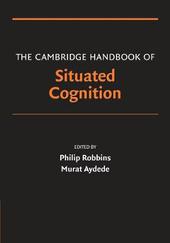
|
The Cambridge Handbook of Situated Cognition
Paperback / softback
Main Details
| Title |
The Cambridge Handbook of Situated Cognition
|
| Authors and Contributors |
Edited by Philip Robbins
|
|
Edited by Murat Aydede
|
| Series | Cambridge Handbooks in Psychology |
|---|
| Physical Properties |
| Format:Paperback / softback | | Pages:526 | | Dimensions(mm): Height 254,Width 178 |
|
| ISBN/Barcode |
9780521612869
|
| Classifications | Dewey:153 |
|---|
| Audience | | Professional & Vocational | |
|---|
| Illustrations |
3 Tables, unspecified
|
|
Publishing Details |
| Publisher |
Cambridge University Press
|
| Imprint |
Cambridge University Press
|
| Publication Date |
3 November 2008 |
| Publication Country |
United Kingdom
|
Description
Since its inception some fifty years ago, cognitive science has seen a number of sea changes. Perhaps the best known is the development of connectionist models of cognition as an alternative to classical, symbol-based approaches. A more recent - and increasingly influential - trend is that of dynamical-systems-based, ecologically oriented models of the mind. Researchers suggest that a full understanding of the mind will require systematic study of the dynamics of interaction between mind, body, and world. Some argue that this new orientation calls for a revolutionary new metaphysics of mind, according to which mental states and processes, and even persons, literally extend into the environment. This book is a guide to this movement in cognitive science. Each chapter tackles either a specific area of empirical research or specific sector of the conceptual foundation underlying this research.
Author Biography
Philip Robbins received his B.A. from Harvard University and his Ph.D. from the University of Chicago. Before coming to the University of Missouri, he taught at the University of Vermont and Washington University in St. Louis. Murat Aydede received his B.A. from Bo azici University in Istanbul and his Ph.D. from the University of Maryland at College Park. Before coming to the University of British Columbia, he taught at the University of Chicago and the University of Florida.
Reviews"Situated cognition has become a hot topic in cognitive science, encompassing a broad range of disciplines and theories concerning the relationship between mind, body and the world. The Cambridge Handbook provides an indispensable guide to the best ideas and controversies concerning the problems of embodied, embedded, distributed and situated cognition. Publication of the Handbook is a landmark in bringing together the foremost theorists in a comprehensive, interdisciplinary collection. The chapters are original overviews concerning historical, foundational, theoretical and empirical issues from philosophy, neuroscience, linguistics, psychology, AI and robotics. The collection is a definitive resource for understanding the central issues in cognitive science today concerning mental representations, their meaning and their grounding interactions with the body and the external world." -Dr. Peter Slezak, University of New South Wales
|